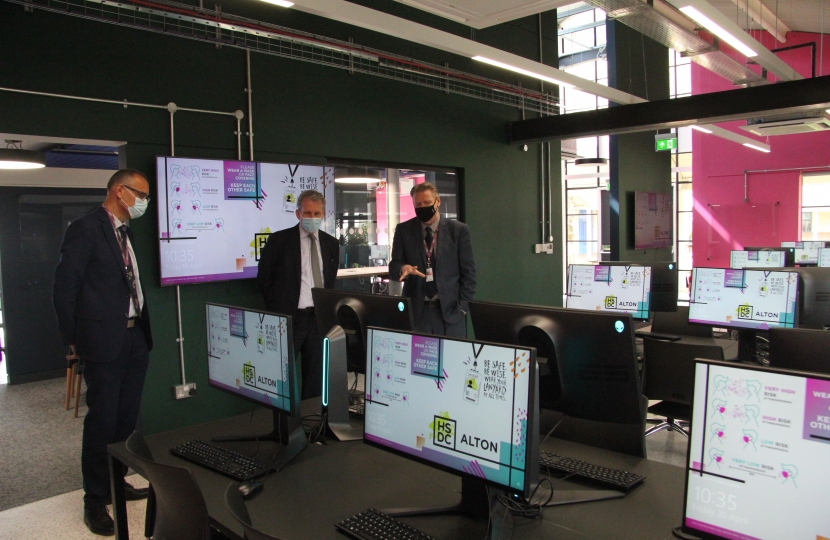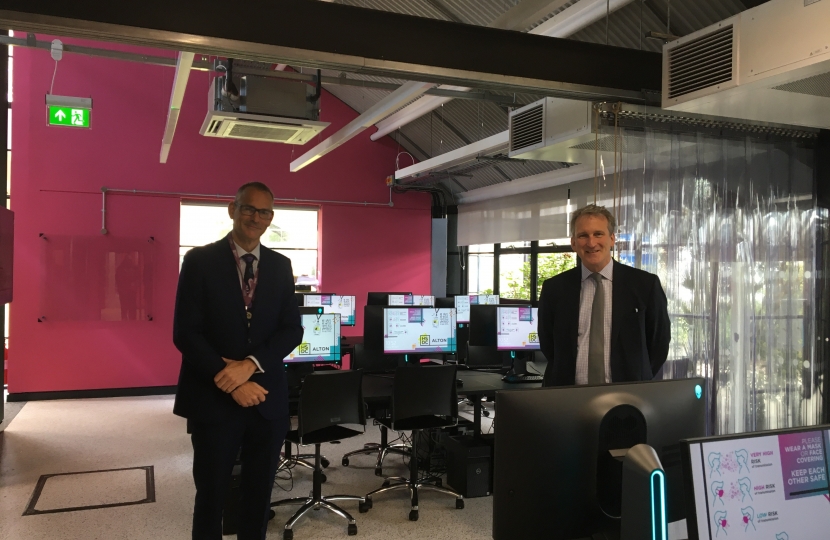This article was written by Damian and published in this week's Herald editions and Petersfield Post:
"On a visit to Germany and Holland as education secretary, I was struck by key aspects of their technical and vocational education. The close links with business and emphasis on on-site development of workplace skills and behaviours. The breadth of what the students covered. The higher number of total hours in a college course.
We have many strong vocational courses in Britain, and much excellent provision. But it is to these benchmarks we must look, as the world economy gets more competitive and we strive to improve productivity – and prospects for the next generation.
Past attempts at reform for one reason or another haven’t achieved what they set out to. Politicians have often talked of the need for ‘parity of esteem’ between the academic and vocational routes, but haven’t always done the things necessary to ensure that.
This is changing. In a long-term project, which has good cross-party support, the 2016 Report of the Independent Panel on Technical Education (also known as the Sainsbury Report, after Lord Sainsbury, who chaired it) is being methodically implemented.
Sainsbury envisaged major reforms to both apprenticeship and college qualifications, and an elevation of the status of higher-level technical qualifications, as a quality alternative to a degree. In all cases, leading businesses would take the lead in setting learning requirements, and employability would be at the heart of courses.
The key reform in college-based 16-18 vocational learning is the introduction of T Levels. T Levels have a significantly greater number of learning hours over a two-year course that most existing vocational qualifications. All subjects require development of English, maths and digital skills, alongside the principal discipline – since almost all jobs these days require them.
Central to the T Level is a 45-day industry placement, that may be done on day release, in a single block or in a number of units. Panels of employers set the standard for attainment.
I have long been excited by the potential for T Levels, and the other Sainsbury reforms. When I was education secretary there was pressure to slow down the programme. I took the difficult decision – it required what is known as a ‘ministerial direction’ – that we should press on, to the original timetable.
That was controversial at the time, but I believed then, and do now, that it was right. We owe it to these young people to prioritise high quality technical and vocational learning. As things have turned out, the challenges from this pandemic I believe make this all the more so.
The first T Levels teaching started last September, and Havant & South Downs College group, of which Alton College is a member, have embraced the T Levels opportunity from the very start. From this September, T Levels will be taught at Alton in Early Years Education, Healthcare (adult nursing) and Digital Design & Development. As elsewhere, work placements and ‘on-the-job’ experience will be a vital component of each.
Last week I had the chance to visit Alton College and hear more about HSDC’s experience to date and the plans for Alton from September. I was impressed to hear of the commitment of local businesses, and the close partnership working.
For businesses, T Levels represent an enhanced opportunity both to invest in the future of our country and to tap into the pipeline of talent. I heard that in sectors from construction to digital design, national names and Hampshire innovators are doing just that.
The strong level of interest from youngsters reminds us that although many young people do elect to go down the academic route, a sizeable number seek a more practical, technical education. In T Levels young people are seeing a very real, high quality option.
It is the substantial workplace-based industry placement that has often most caught the eye both of prospective students and their potential future employers – though the other enhanced elements are very important too.
There are a lot of calls on business these days – from requests to support careers advice and Year 10 work experience, to asks for KickStart placements. Firms I am hearing from are absolutely seeing the importance of T Level placements too. To maximise this opportunity for the future of British business, and to boost our productivity, we are indeed going to need a lot more industry placements over time. I hope that more and more Hampshire businesses of all sizes will take a look.
And key to supporting the efforts of colleges and businesses is getting the T Levels message to the people who are often the most influential careers advisers in a young person’s life: parents. It needs a sustained communications effort, to help everyone understand the new qualification, and what makes it stand out.
None of this will happen overnight – it is a long-term project. But with the foundations of reform now in place, we have an immensely exciting and valuable opportunity.
Parliamentarians have a role to play, too. I’m chairing a new All-Party Parliamentary Group (APPG) for T Levels. It was established last week, bringing together members of both the Commons and the Lords with a particular interest in technical and vocational education. I’m so pleased to be joining with a group with a depth of insight and experience, from across the political spectrum.
At our first session, it was great to welcome both education secretary Gavin Williamson and the Skills Minister (and nearby MP) Gillian Keegan, to speak and take questions. I was really pleased that such a wide variety of both colleges and businesses were able to attend, and it will be a privilege to chair this forum going forward.
In many ways, the pandemic has accelerated significant changes in the jobs market, with the ‘Build Back Better’ agenda driving global focus and investment. The rapid growth in digital technology, the boost to biosciences and research, the focus on new energies and sustainable development; these are just some of the sectors where we really need to build our skills base.
T Levels are a central part of a broader agenda to support the development of young people. Apprenticeships, work placements, internships and the newer Kickstart Scheme are all designed to give real world experience and skills to build the workforce of the future. We have a generational opportunity for a major upgrade in our technical and vocational education, benchmarked against the world’s leading systems. It is one we must seize with both hands."




